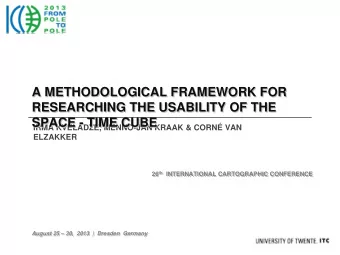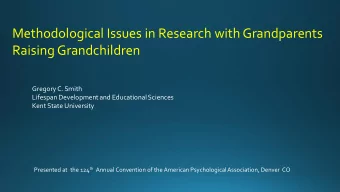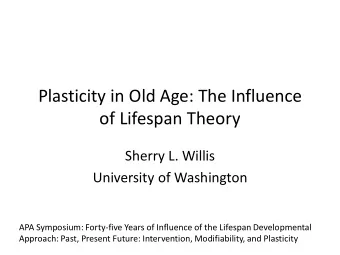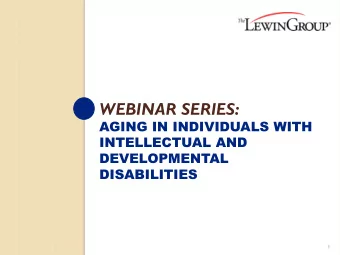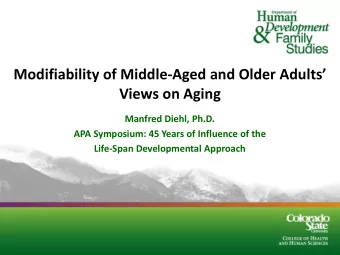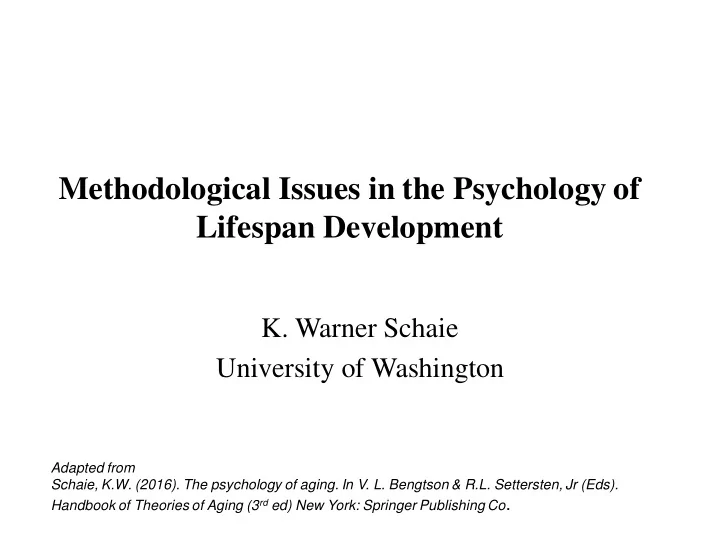
Methodological Issues in the Psychology of Lifespan Development K. - PowerPoint PPT Presentation
Methodological Issues in the Psychology of Lifespan Development K. Warner Schaie University of Washington Adapted from Schaie, K.W. (2016). The psychology of aging. In V. L. Bengtson & R.L. Settersten, Jr (Eds). Handbook of Theories of
Methodological Issues in the Psychology of Lifespan Development K. Warner Schaie University of Washington Adapted from Schaie, K.W. (2016). The psychology of aging. In V. L. Bengtson & R.L. Settersten, Jr (Eds). Handbook of Theories of Aging (3 rd ed) New York: Springer Publishing Co .
Work on the Seattle Longitudinal Study, data from which are reported here, has been supported by grants from: The National Institute of Child Health and Human Development (HD00367, 1963-1965; HD04476, 1970-1973) National Institute of Aging (AG00480, 1973-1979; AG03544, 1982-1986; (AG04470, 1984-1989; AG08055, 1980-2006; and AG027759, 2006-2008; currently AG024102, 2005- 2016).
Methodological Issues in the Psychology of Lifespan Development • Introduction • The Beginning of the American Psychology of Aging • The Influence of Methodological Advances on the Psychology of Aging • The Increasing Interdisciplinarity of Geropsychology • The Role of Longitudinal Studies in Geropsychology • Summary
Beginning of the American Psychology of Aging • Jones and Conrad - Cross-sectional studies, 1933 • Cowdry - Problems of Aging. 1939 • J. E. Birren, Handbook of Aging and the Individual , 1959 • G. Stanley Hall, Senescence the 2 nd Half of Life . 1922
The Influence of Methodological Advances on the Psychology of Aging • Shift from predominance of cross-sectional studies of age differences to longitudinal studies and understanding of shifts within individuals across time
Sequential Design Strategies
Cross-Sectional Age Differences
Longitudinal Age Changes
The Influence of Methodological Advances on the Psychology of Aging • Shift from predominance of cross-sectional studies of age differences to longitudinal studies and understanding of shifts within individuals across time • Confirmatory factor analysis as a major tool for hypothesis- testing • Shift to assessing psychological constructs by means of multiple measures
SLS Longitudinal Factor Structure
The Influence of Methodological Advances on the Psychology of Aging • Shift from predominance of cross-sectional studies of age differences to longitudinal studies and understanding of shifts within individuals across time • Confirmatory factor analysis as a major tool for hypothesis- testing • Shift to assessing psychological constructs by means of multiple measures • Consideration of chronological age as a dependent rather than as an independent variable (Wohlwill, 1973)
Hazard rate of encountering significant decrement in differences among abilities in every 7-year period Schaie & O’Hanlon, 1990
The Influence of Methodological Advances on the Psychology of Aging • Shift from predominance of cross-sectional studies of age differences to longitudinal studies and understanding of shifts within individuals across time • Confirmatory factor analysis as a major tool for hypothesis- testing • Shift to assessing psychological constructs by means of multiple measures • Consideration of chronological age as a dependent rather than as an independent variable (Wohlwill, 1973) • Use of structural and functional MRI for direct test of relation between changes in brain structure and behavior
Areas With Significant Longitudinal Change (Total Sample) < -.005 0 > .005
The Increasing Interdisciplinary of Geropsychology Examining behavioral change within the context of societal change, Bengtson, Kaschau & Regan, 1977; Riley, Foner & Riley. 1999 • Recognition of lasting heritable influences, Schaie, Plomin. Willis et al, 1992; Schaie & Zuo, 1991 • Age-related changes in the efficiency of the physiological infrastructure. Siegler & Costa, 1985, Cristofalo, Tresini , Francis & Volker, 1999. • Behavioral changes as predictors of risk of late life chronic diseases an dementia, DeFrias, Schaie, & Willis, 2014
The Role of Longitudinal Studies in Geropsychology Extending early life longitudinal studies through adulthood : • Longitudinal studies of children, who were followed into adulthood (e.g., Berkley Growth & Guidance Studies, Eichorn et al, 1981) • Longitudinal studies of young adults in college, who were followed through adulthood (ROTC,WWI, Owens, 1966)
The Role of Longitudinal Studies in Geropsychology 2 Orientations to Longitudinal Studies of Geropsychology: • Study of aging requires study of entire adult life span – Focus on mechanisms underlying individual differences • Focus on elderly as of primary interest – Clinker approach – Duke Longitudinal Study, Palmore et al., 1985
The Role of Longitudinal Studies in Geropsychology Identifying factors related to individual differences in rate of aging: • Demographic Factors – education, occupation • Chronic disease • Lifestyle • Personality • Social relations • Life satisfaction
Effects of Education & Occupation on Ability Change Educational Level & Age-related Change in Verbal ability Occupational Status & Age-related Change in Verbal Ability
Antecedents of Individual Differences in Age Change 1. No cardio-vascular and other chronic diseases 2. Living in favorable environmental circumstances 3. Involvement in activities characteristic of intellectually stimulating environments 4. Flexible personality style at midlife 5. Married to an intelligent spouse 6. High levels of perceptual processing speed 7. Being satisfied with their life accomplishments.
Thank you
The Influence of Methodological Advances on the Psychology of Aging • Shift from predominance of cross-sectional studies of age differences to longitudinal studies and understanding of shifts within individuals across time • Confirmatory factor analysis as a major tool for hypothesis- testing • Shift to assessing psychological constructs by means of multiple measures • Consideration of chronological age as a dependent rather than as an independent variable (Wohlwill, 1973) • Use of structural and functional MRI for direct test of relation between changes in brain structure and behavior
Recommend
More recommend
Explore More Topics
Stay informed with curated content and fresh updates.







